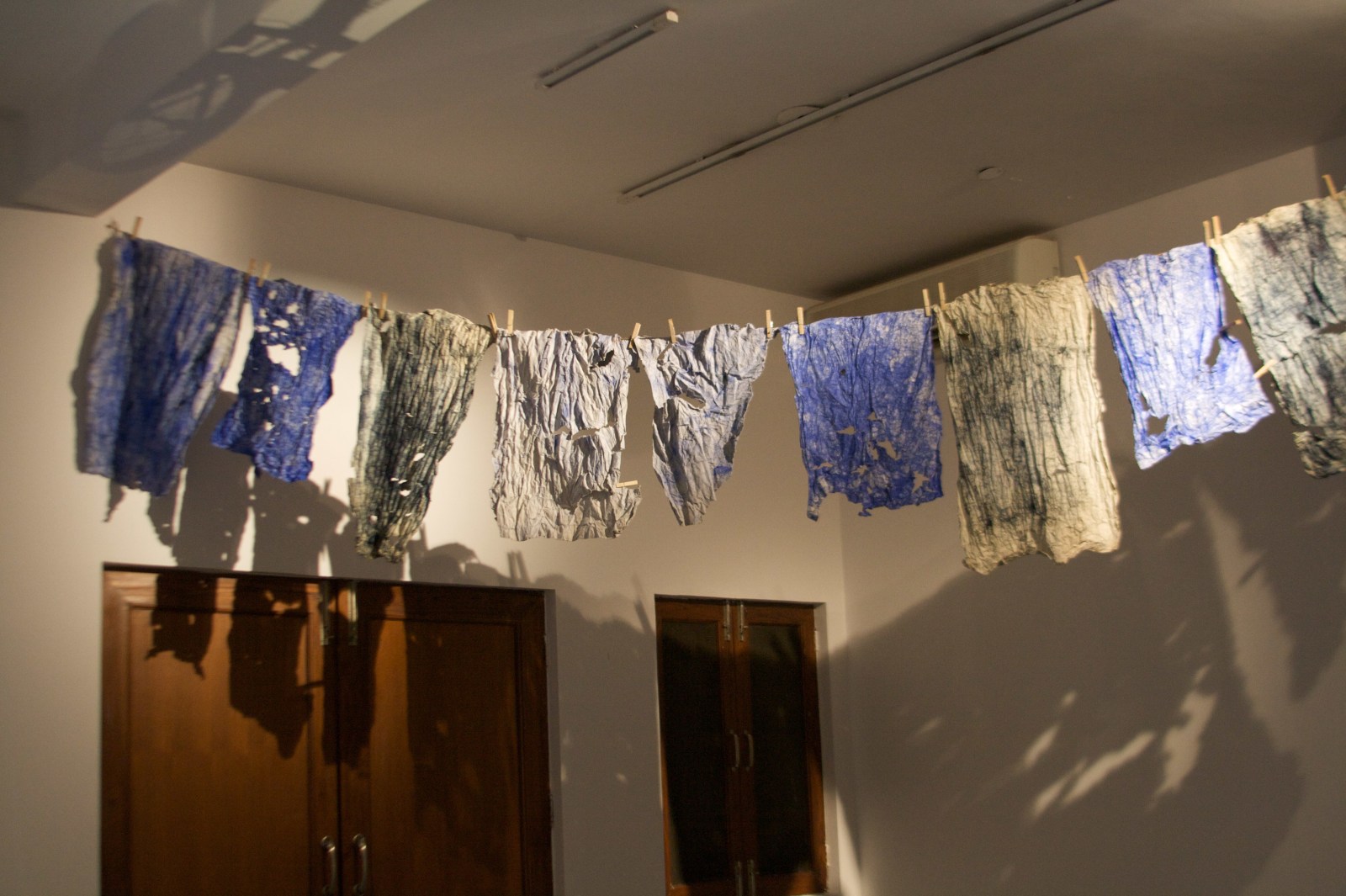
Rummana Hussain's show of installations and paintings, 'Multiples and Fragments,' is revealing in the links she makes between what she believes in, the means and the medium she used to express herself, and the reality she speaks of.
Her own defense of domesticity as a series of arduous activities that demand a host of skills. even as they remain unappreciated, and dismissed as worthless, stands convincingly supported by her portrayal of the domestic, and what falls within its domain.
The use of materials easily available around the house, such as 'neel' used to whiten clothes, and natural pigments like the saffron 'geru' are skillfully used to drive home the understanding between the woman and nature as a feminine force, as well as the politics of housekeeping. Hussain's work is quite naturally subjective. yet there is always enough scope for the viewer to find his/her own explanations.
'Indigo,' for one, takes the form of a clothesline. where the crushed paper is worked upon using indigo and 'neel.' Hussain here attempts to tackle the issue of oppression, whether in the colonial past, (her use of indigo refers to the oppression by British planters of indigo growers), or a supposedly 'free' present, when women are the subjects of a male gaze. and Judged according to a male prescription. Domesticity is also the issue with which she tries to concern herself, and her viewers in her newest works comprising xeroxes and colleges. postcards and small canons, all suspended in tile covers, and building up to the question she is posing.
Hussain also uses mirrors to produce multiple images, seeming to question what 'the real thing is, and on her part, rejecting any such absolute truth. In 'Fragment from Splitting', images have no one strictly defined meaning and do not retain a monolithic character that cannot be altered. This open-endedness then allows the viewer breathing space. and the chance to explore while the exhibit itself retains its appeal and freshness.
Paper has come to play a fascinating and altered role in Hussain's works: instead of merely being the blank space upon which the artists begin to work, it has been given a quality and character of its own. Crumpled, tattered, even carefully crushed, this paper becomes an intrinsic part of the painting, as in 'Strain', or 'Indigo,' or even when it is peeled off to expose a lower layer.
Hussain's works are appealing precisely because they allow the mind to react to the ideas that the artist is constantly offering, without dictating any terms and conditions at all.
PHOTO EXHIBITION: The exhibition of photographs from Germany and India, on at Max Mueller Bhawan. spans the decades roughly from the '20s onwards to more recent times. These are, in most cases group or family shots, and not unlike personal records in nature.
The grouping together of several of these snapshots are fruitful in more ways than is immediately obvious. It explains how photography was perceived, and how people related to a camera. and of their images being recorded for posterity, and how, over the years, as technology in the form of user-friendly gadgets, had permeated more and more homes, the camera. too, has taken on a much less intruding role, and become much more, a part of people's lives than ever before. This becomes noticeable in the photograph itself, and its changing nature. The German ones change, as in the case of 'couples,' which were, in earlier times, almost exaggerations of reality as couples lovingly take on dramatic poses for the camera. With being photographed becoming more and more commonplace, people too seem to regard it much more casually.
In the Indian section, regrettably, much smaller than the German, some of the older photos are a means to live out a fantasy, even if it is in a studio, one can see an instant transformation of ordinary people into highly decorated soldiers, or in combat with a lion, or frolicking away with popular film stars.
This show is not only about how photography was perceived, how this has changed and become much more of an everyday activity, but also a glance into the ordinary and quotation from the humble past.
-Bharati Chaturvedi